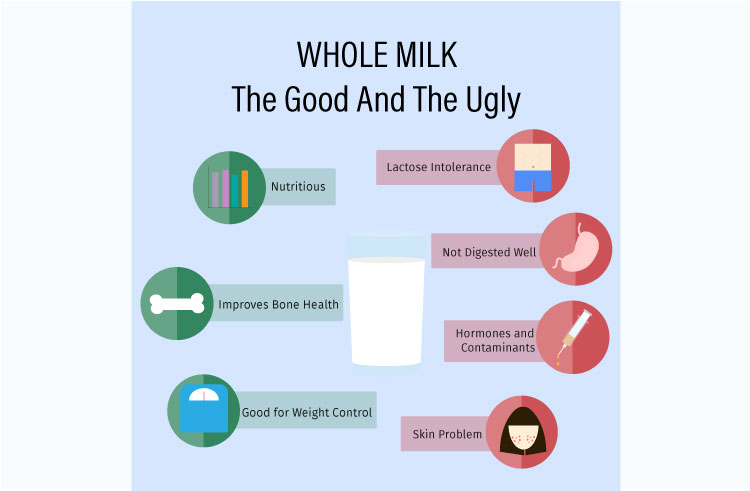Nutrition
Per 100 ml of natural, unfortified whole milk
Energy 65 kcal
Fat - 4 g.
Proteins - 3 g.
Carbohydrate - 5 g.
Sugars- 5 g.
Fiber - 0 g.
Vitamins - Vitamin A 2%, Vitamin B-12 8%,
Minerals - Calcium 12%, Magnesium 3%
Benefits
Nutritious
Cow’s milk are very nutritious. The milk has more calories than other milk, but it also contains most of the nutrition we need. Cow’s milk is high in fat but not necessary the bad one. In addition, it contains fat soluble vitamins such as Vitamin K-2 , which helps regulating calcium. Although, the nutrition content depend on how the cows are raised. Grass-fed and pasture raised cows produced the most nutrition dense milk.
Improves Bone Health
Milk has vitamins and minerals that are essential for bones heath, calcium is one of the most important. Studies shows the consuming milk helps improve bone density in children and may lower risk of fracture in elderly.
Good for Weight Control
Debunking idea of some low fat diets, consuming whole fat milk may actually prevent weight gain. The study found that drinking whole milk also help reduce obesity in men and women overtime. Another study found the relation of fatty acid in milk relate to lower risk of type-2 diabetes.
Side Effects
Lactose Intolerance
Lactose is a type of sugar found in milk and dairy products which in intolerance happens when a person is unable to digest lactose fully or not at all. Some symptoms occurs after few hours of consuming milk are bloating, diarrhea, stomach cramps and feeling sick.
Not Digested Well
As we aged, we produce less enzyme that helps digest cow’s milk protein. You might not be diagnose for having lactose intolerance but you might have some similar symptoms. Other identical symptoms are indigestion, fatigue, headaches and asthma.
Hormones and Contaminants
Even when you buy your cow’s milk organic, there is still relatively high amount of hormones in it. The hormones include estrogen, progesterone and recombinant bovine growth hormone (rBGH) which all known to disturb human hormonal function.The hormones are in put into female cows for fake pregnancy purpose, so they can produce the milk all year round.
Cow’s has also been through industrial process which also contains contaminants such as antibiotic and dioxin which interrupt the immune and reproductive systems..
Skin Problem
Growing researches found the link between acne and diary product particularly milk. Milk is know to be an insulin release stimulator and Insulin-like Growth Factor 1 (IGF-1) which are also indicated as cause of acne. Milk is also rich in hormones that may cause acne in puberty.
Final Thoughts
Whole milk comprises almost all the nutrient our body needs in a day. It has lots of calcium and vitamin D that is really good for the bone. Whole milk also keep us fulfilled and might help with weight control. However, humans are the only species that drink other species milk after adolescence, which explain why some people has problem digesting cow's milk and cause sensitivity in some people. The industrial process of cow's milk nowadays also inject hormones into the cows to make it possible to provide us milk all year round. These are the downside of consuming cow's milk which personally I didn't stop drinking cow's milk completely, but I've tried to avoid it as much as I can because I found that whole milk is the reason that cause me acne and mild indigestion.

